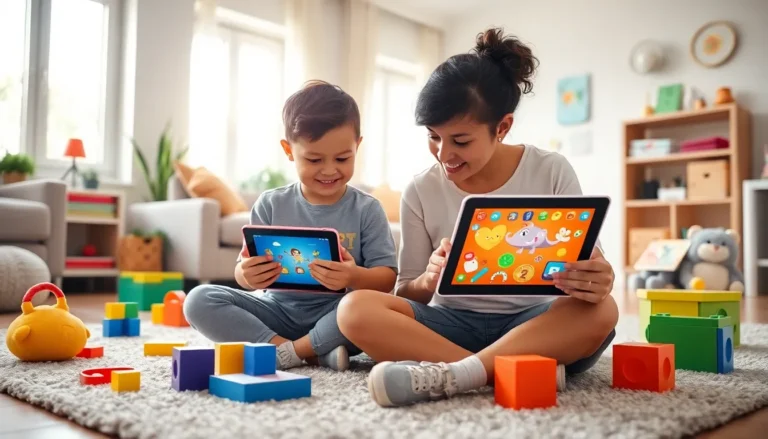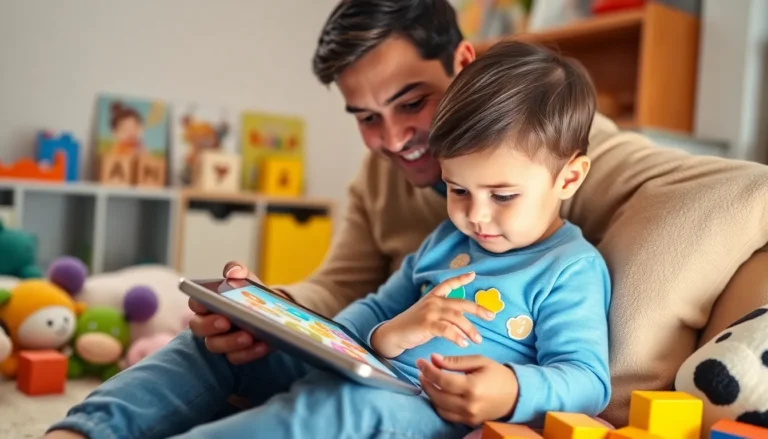Parenting’s a wild ride, and it gets even wilder when you dive into the world of solo and single parenting. While both paths involve raising kids without a partner, the nuances can make all the difference. Imagine navigating a rollercoaster with one hand on the wheel—it’s exhilarating, but it can also be a bit confusing.
Table of Contents
ToggleUnderstanding Parenting Structures
Solo parenting involves raising a child without any support from a partner or co-parent. This structure often includes individuals who are the primary caregivers and bear full responsibility for their child’s upbringing. Parents in this situation face unique challenges, including financial strain and the emotional toll of managing every aspect of parenting alone.
Single parenting, on the other hand, typically refers to a parent who is not in a relationship with their child’s other parent but may still have an active co-parenting arrangement. In many cases, single parents share responsibilities and decision-making with the other parent, even if they don’t live together. This dynamic allows for some shared involvement, which can reduce stress and improve emotional well-being.
Both structures present distinct circumstances. Solo parents often juggle multiple roles, becoming both caregiver and sole provider, which can lead to increased pressure. Single parents might experience the complexities of co-parenting, where communication and coordination with the other parent become essential.
Many solo parents report feeling isolated, as they may lack the emotional and practical support that often comes from a partner. Single parents, while also facing challenges, often rely on their co-parents for support in various situations.
Financial aspects often vary between the two. Solo parents may experience a higher financial burden due to the lack of shared income. Single parents might benefit from shared expenses but still encounter hurdles when managing finances with another adult involved. These distinctions illustrate that each parenting structure comes with its own set of experiences and challenges.
Solo Parenting Defined
Solo parenting involves raising a child without any support from a partner. Complete responsibility rests on the individual, which can result in unique challenges and dynamics.
Characteristics of Solo Parenting
Solo parents operate independently in raising their children. Full financial responsibility often falls on them, creating economic strain. Emotional support may also be limited, leading to feelings of isolation. Daily decision-making requires self-reliance, as they navigate parenting tasks solo. Strong problem-solving skills become essential, as parents frequently face unforeseen challenges.
Challenges Faced by Solo Parents
Solo parents frequently encounter significant emotional challenges. Feelings of loneliness can intensify without a co-parent. Financial stress often arises from managing all expenses alone. Time management becomes crucial, as balancing work, parenting, and personal needs proves demanding. Also, solo parents may struggle to find adequate resources or support networks. Accessing childcare options can become complicated, adding to their stressors.
Single Parenting Explained
Single parenting involves one parent actively participating in raising their child without a partner. This dynamic often includes shared responsibilities, as single parents sometimes co-parent with the child’s other parent.
Characteristics of Single Parenting
Single parents maintain various characteristics that distinguish them from solo parents. Shared custody arrangements often define their structure. Many single parents communicate with their co-parent, fostering collaboration on decisions affecting the child. Flexibility becomes essential, as they must adapt to different parenting styles or schedules. Emotional and financial responsibilities may be split, leading to a more balanced approach in some cases. Furthermore, children in single-parent households may still engage with both parents, facilitating healthy relationships despite not living together.
Challenges Faced by Single Parents
Single parents encounter unique challenges that affect their daily lives. Coordinating schedules often proves difficult, requiring effective communication and teamwork between parents. Conflict may arise, leading to emotional stress and impacting decisions. Financial concerns also arise, with single parents managing household budgets alone. Time management becomes crucial, as juggling work and parenting duties can lead to exhaustion. Support networks play a vital role, often helping single parents navigate these difficulties. Seeking reliable childcare options may also become a significant hurdle, impacting their ability to work or maintain personal time.
Key Differences Between Solo and Single Parenting
Solo and single parenting carry distinct emotional and social dimensions. Solo parents often experience heightened feelings of isolation and loneliness. Lack of a partner means fewer opportunities for shared emotional support, which can lead to increased stress. They may find it challenging to forge social connections, impacting their overall well-being. Single parents typically benefit from co-parenting dynamics that allow for shared emotional responsibilities. Effective communication with the child’s other parent can facilitate social engagement and promote a supportive network.
Financial aspects differ significantly between these two parenting styles. Solo parents shoulder the entire financial burden alone, which may lead to economic strain. Without shared income or resources, budgeting becomes a complex challenge. Contrastingly, single parents may share expenses with their co-parent, easing some financial pressures. Their ability to coordinate financial responsibilities can enhance stability and resource accessibility, making day-to-day management more manageable.
Understanding the differences between solo and single parenting is essential for recognizing the unique challenges each parent faces. Solo parents navigate the journey independently often feeling isolated and overwhelmed by the weight of full responsibility. In contrast single parents can share the load through co-parenting arrangements which may provide emotional support and financial relief.
Both parenting styles come with their own set of hurdles but also opportunities for growth and resilience. By acknowledging these differences parents can better equip themselves to seek the support they need and foster a nurturing environment for their children. Ultimately it’s about finding the right balance and resources to thrive in their parenting journey.








